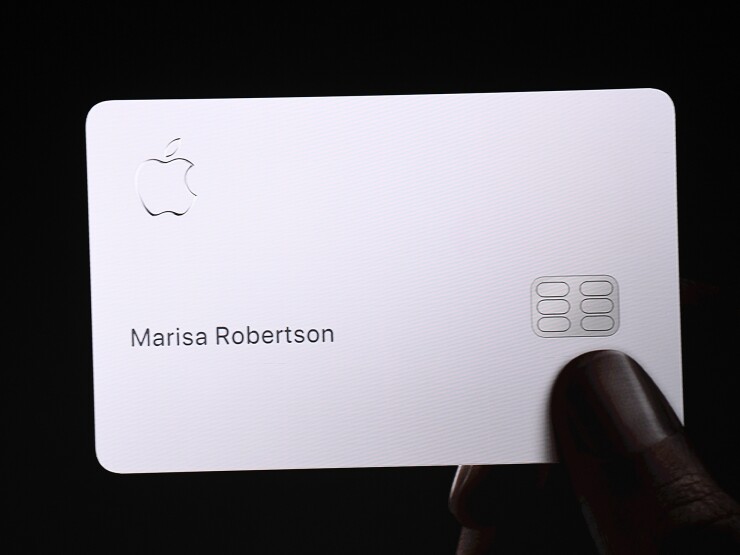
Apple can be a brutal negotiator, and Goldman Sachs has apparently had enough, according to
Payments industry experts say it's not completely surprising that nearly four years after the Goldman-issued
"In short, Goldman didn't say 'no,' enough to Apple," said Hugh Tallents, a senior partner at New York-based strategy consulting firm cg42.
In its pursuit of "tech-style" growth, Goldman was relatively loose with its underwriting rules and approved many borrowers with mediocre FICO scores, leading to a higher-than-average rate of delinquencies and charge-offs, Tallents said.
"Goldman's charge-off rate with the Apple Card was double the industry average and you can't sustain that, even if you value the Apple partnership," he said.
Goldman reported a $1.2 billion loss through the first nine months of 2022, with most of the losses attributed to the Apple Card. Earlier this year, Goldman
"Many banks that have been tempted to create a financial supermarket found themselves fighting the rising tide of fragmentation in consumer finance, and while Goldman is a world-class investment bank, it's a sub-par consumer underwriter and retail player," Tallents said.
Apple's size and market power can make or break partnerships, analysts say. Citizens Bank launched its now-thriving
"Despite the fact that Apple recently became the most capitalized company ever, with a market cap of $3 trillion, the Goldman Sachs debacle illustrates that the fundamental rules of strategy apply even to the largest institutions in the world," said Philippe De Backer, managing partner and global practice leader of financial services at international consulting firm Arthur D. Little.
Goldman agreed to handle the underwriting and hold the receivables for the Mastercard-branded Apple Card. Only cardholders can apply for one of
But Apple's control of Apple Pay and its overall ecosystem gives the Cupertino, California-based tech giant multiple advantages.
For example, Apple opted to be the underwriter and owner of
"Apple has built both its reputation and its business on disruption, and working in non-regulated territory, and they have tried to take the same approach in the financial sector. But the retail banking market is more complex and controlled than anything it's encountered before," De Backer said.
Walmart, another market giant that likes to call the shots in its partnerships, is also involved in a clash with its credit card-issuing partner.
In this case, Walmart in April
Goldman, with little experience in the consumer credit card industry, may have underestimated the challenges of turning a profit during erratic economic cycles when consumer creditworthiness can suddenly deteriorate in a downturn, driving delinquencies and charge-offs. But Goldman's deal with Apple didn't provide room for negotiation.
Another potential miscalculation in Goldman's Apple Card deal is the card's unique structure, with no annual fee and no late fees, according to Richard Crone, a principal with Crone Consulting. Users can choose any amount they want to repay toward their balance each month, and Apple Card instantly recalculates the interest. Apple purchases made with Apple Card's monthly installment plan are interest-free.
"That user interface suits Apple's focus on the consumer, but it's likely a costly interface for Goldman to manage," Crone said.
The Wall Street Journal, which first reported the news, said American Express is one of the companies in contention to take over Goldman Sachs' role, which observers say could be a good fit.
"Whoever picks up the Apple Card portfolio will win the benefits of the investment Goldman already made, and it could be quite profitable for the newcomer if they bring in new technology to economize on servicing loans by using generative AI, which is jemerging as a cost-saving path for card issuers," Crone said.
Goldman and American Express declined to comment on the reports.
Although Goldman hasn't disclosed its total number of Apple Card accounts, Crone estimates the portfolio ranges between 6 million and 12 million card accounts, giving the Apple Card portfolio a potential value range of about $1.35 billion to $2.7 billion, assuming industry profit averages.
"Goldman could potentially cover their losses if the Apple Card portfolio sells on the high side, and it could work out well strategically for Amex, which already has deep consumer underwriting experience and operates as both an issuer and an acquirer," Crone said.
The credit card industry, with its tight regulations — including the prospect of the Consumer Financial Protection Bureau dictating sharply lower ceilings on
"The credit card issuing business is really a combination of multiple businesses underpinned by different revenue models, operating models, technology, internal capabilities and clients — this makes it very difficult to price risk well and develop a business model which can yield profit, especially if it's not your core area of expertise," De Backer said.






